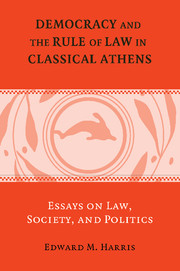Book contents
- Frontmatter
- Contents
- PREFACE
- ACKNOWLEDGMENTS
- ABBREVIATIONS
- INTRODUCTION
- I LAW AND CONSTITUTIONAL HISTORY
- 1 Solon and the Spirit of the Law in Archaic and Classical Greece
- 2 Pericles' Praise of Athenian Democracy
- 3 Antigone the Lawyer, or the Ambiguities of Nomos
- 4 How Often Did the Athenian Assembly Meet?
- 5 When Did the Athenian Assembly Meet? Some New Evidence
- 6 Demosthenes and the Theoric Fund
- II LAW AND ECONOMY
- III LAW AND THE FAMILY
- IV ASPECTS OF PROCEDURE
- V ENVOI
- BIBLIOGRAPHY
- INDEX LOCORUM
- SUBJECT INDEX
6 - Demosthenes and the Theoric Fund
Published online by Cambridge University Press: 25 February 2010
- Frontmatter
- Contents
- PREFACE
- ACKNOWLEDGMENTS
- ABBREVIATIONS
- INTRODUCTION
- I LAW AND CONSTITUTIONAL HISTORY
- 1 Solon and the Spirit of the Law in Archaic and Classical Greece
- 2 Pericles' Praise of Athenian Democracy
- 3 Antigone the Lawyer, or the Ambiguities of Nomos
- 4 How Often Did the Athenian Assembly Meet?
- 5 When Did the Athenian Assembly Meet? Some New Evidence
- 6 Demosthenes and the Theoric Fund
- II LAW AND ECONOMY
- III LAW AND THE FAMILY
- IV ASPECTS OF PROCEDURE
- V ENVOI
- BIBLIOGRAPHY
- INDEX LOCORUM
- SUBJECT INDEX
Summary
the road to historical error is often paved with good intentions. Certainly no one had better intentions than the scholar Libanius when he wrote his hypothesis to Demosthenes' First Olynthiac. Observing that Demosthenes makes a proposal about Athenian finances in the speech, Libanius realized that contemporary readers might find the orator's discussion of the topic unclear. He therefore ventured to offer an account of the Theoric Fund and the Athenian law regulating its disbursement to help readers understand Demosthenes' proposal. Once upon a time, Libanius explains, there were no seats made of stone in the Theater of Dionysus, only wooden benches. Nor was there any charge for admission. As a result, scuffles and brawls often broke out as everyone rushed to grab a seat. To prevent this mayhem, the leaders of the community decided to charge a fee of two obols for seats. They also began to distribute public funds to the poor so that they would be able to afford the price of admission. This practice gradually developed to the point that all public funds were distributed. Instead of receiving a wage for service in the army, citizens preferred to remain at home to attend religious festivals.
Libanius states that this led to a situation in which the Athenians no longer wished to serve on military campaigns and endure the dangers of warfare. They therefore passed a law making it a capital offense to propose that the money in the Theoric Fund, from which the distributions were made, be paid for military purposes.
- Type
- Chapter
- Information
- Democracy and the Rule of Law in Classical AthensEssays on Law, Society, and Politics, pp. 121 - 140Publisher: Cambridge University PressPrint publication year: 2006
- 1
- Cited by



